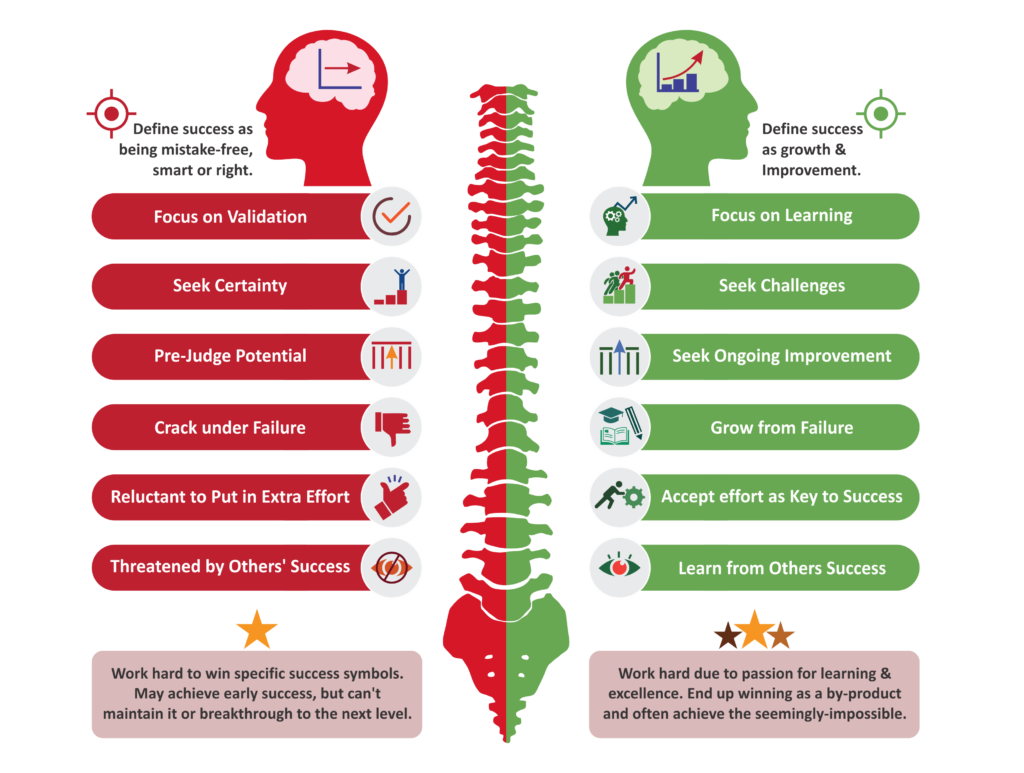Fixed Mindset VS Growth Mindset
Fixed Mindset VS Growth Mindset
Companies and leadership teams with “Growth Mindset" are seeing excellent results in the past 120 days irrespective of COVID-19 disruptions. How is your company doing?
“Review, Reflect, Learn, and Change" has been a practice of mine for the past several years.
As I was reflecting this past weekend, I realized that it happened to be 115-days since I had undertaken any business travel compared to year 2019 where I had already visited five different countries assisting small and medium businesses.
This prompted me to further reflect on everything that has happened in the past 115 days, lessons learnt, best practices etc. that I am sharing with you in this article about Fixed Mindset Vs. Growth Mindset.
Our business EGOS LLC revenue is up 54% year over year compared to 2019. This is good news as we are busy serving our customers and assisting our customers to be busy serving their customers.
Then I started thinking about my customers and their businesses. One customer of mine has hired 38 people since the pandemic started and have been very busy. Their revenue is expected to be $12 million over its budget for the year 2020.
The second customer has been able to retain all his staff irrespective of only 50% workload. We reevaluated their 5-year strategic plan, modified it so that they can execute it in 3 years. They took advantage of the 50% less workload and trained all of their employees to take on bigger roles and handle addional work productively. They even hired 6 new people so that they are ready for the explosive growth they are forecasting based on their updated strategy.
A third customer of mine realized that they were being very conservative in their growth trajectory at 10% per year. We reevaluated their growth strategies and associated assumptions and created a new strategy that would enable them to grow by an average of 40% per year for the next 5 years. A brand new “Growth PlayBook” has been developed and are currently busy executing to the new goals.
A fourth customer had a neutral effect on their business, no gain, no loss. They are just going with the flow and eathering the storms as they come along.
A fifth customer had got into lots of trouble. Their revenue is down by 70%. They had to lay off employees and are scrambling to stay float.
My initial review lead me to think that these different results could have been due to the industry segment they were in. On further reflection, I could see a pattern in their indivial and team thinking and their approach to the challenges that came about COVID-19. Please note that all the above mentioned companies have been in business for over 10+ years.
I would summarize it as: “Fixed MindSet VS Growth MindSet”

Fixed Mindset Vs Growth Mindset
“People in a growth mindset don't just seek challenge, they thrive on it. The bigger the challenge, the more they stretch.”
| Fixed Mindset | Growth Mindset |
|---|---|
| FOCUS ON VALIDATION Customers who were struggling were focused on being perfect, mistake-free, smart, or right. The focus was on validating themselves. The focus was on others perceptions, what will others think of us; they wanted to appear smart and successful, and avoid situations where they and their organizations looked terrible. |
FOCUS ON LEARNING Customers who were growing despite the challenges we're focused on improving and learning. This focus on learning enabled them to focus on growth. The focus was on stretching themselves to become smarter and better, rather than just appearing to be so. |
| SEEK CERTAINTY The leadership team and the organization thrived when they were in their comfort zone and felt confident in their success. They were interested only when they could see results, and lost focus when things don't work out predictably. Hence, preferred tried-and-tested activities that validate what they're confident or good at in an unpredictable environment |
SEEK CHALLENGES The leadership team and the organization thrived when they embrace challenges. They focused on learning from others who are better than them or can push/help them to grow. They loved experiences that stretched them and were driven by a desire to push their boundaries—so much so that few of them achieved the impossible of doubling their employee count |
| PRE-JUDGE POTENTIAL The organizations and their leadership teams that were not so successful unfortunately limited themselves to evaluations and past performances that supposedly tell them what they can achieve. They focused on past success to validate their decisions and actions. These leadership teams of fixed mindset companies felt they were entitled to success because they were unique and focused on past achievements. |
SEEK ONGOING IMPROVEMENT The organizations and their leadership teams that were successful focused on their ability to develop new skills, their willingness and ability to learn. They always sought out opportunities to grow and stretch themselves. These leadership teams with a growth mindset generally had a more accurate self-assessment of their strengths, weaknesses, limitations. Since they believe they can improve in any area, they focused on objectively assess their current abilities so they can identify exactly what/ how to improve. |
| CRACK UNDER FIRE Organizations and leadership teams with a fixed mindset allow the failures/chaos and turbulent situations to define them permanently. They may blame themselves, throw up their hands, and just became inactive and maintain status co. They were trying to hide behind their deficiencies, finding blame, or excuses. |
GROW FROM FAILURE Organizations and leadership teams with a growth mindset may also feel upset with failures/chaos. Still, they see the mistake as an incident and a problem to overcome or an opportunity to learn and grow. They try to identify their shortfalls, confront the challenges, and seek alternative routes to success.If you deny your mistakes, you can't learn from them. |
| RELUCTANT TO PUT EXTRA EFFORT Leadership teams with a fixed mindset were afraid to put in effort since (a) they need to work harder means they were not "special" enough, and (b) They silently worry that your best effort may be inadequate. People with a fixed mindset tend to put in hard work only to achieve a specific outcome (e.g., to win an award or get to a particular position or goal). |
ACCEPT EFFORT AS KEY TO SUCCESS An effort is crucial to success, regardless of your level of talent. Most "geniuses" or growth companies accomplish what they do through hard work. Inventions are not a flash of brilliance, but the result of a series of discoveries that make a breakthrough possible. There's nothing wrong with the desire to win; the issue is whether winning is a means or an end. People with a growth mindset are driven by their passion for excellence, and end up winning as a result of their growth. |
Summary of Growth Mindset
Having a growth mindset doesn't mean that you must change everything or seek perfection
VRT Management Group, LLC (VRT) is a Business Transformation Company with a single focus: serving our customers to solve their toughest problems by building people and transforming business processes.
Our unique strength comes from integrating people and processes best practices to address your ever evolving customers’ needs
EGOS LLC © 2024 All Right Reserved

